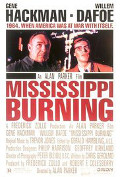
Directed by
Alan Parker
129 minutes
Rated M
Reviewed by
Bernard Hemingway

Mississippi Burning
Although as a crime movie Mississippi Burning suffers from a too convenient plot resolution, as a depiction of early 1960s rural Mississippi with its entrenched role segregation it is an effective and moving film.
Based on the real disappearance of three young civil rights workers who were part of a voter registration drive in Mississippi in 1964 it tells the story of the two FBI agents (or "Hoover Boys" as the rednecks call them) who arrive to investigate. Ward (Willem Dafoe) is the idealistic by-the-book outsider from up North, Anderson (Gene Hackman) a hard-nosed former Mississippi sheriff with a hands-on approach to detective work.
The old cop-young cop pairing is a tried and true one and has been seen in innumerable police movies but it works well here with Hackman well-suited to the role as the wily old hand and Dafoe whose career was, somewhat surprisingly, peaking, looking and acting the part as his fresh-faced superior. Much of the film’s entertainment value comes from the dynamic between these two.
The film, however, has a strong moral agenda as its core concern and this is brought home by its depiction of the Deep South of the time, just as the civil rights movement was starting to gain momentum. The depiction of inherent brutality of white suprematism is unforgiving, the film giving a real sense of actuality to the kinds of things we usually only see in snippets in documentaries – from segregated diners to the Klu Klux Klan and its cowardly violence. As a production Mississippi Burning is impressive with art direction that gives us a real sense of place and time.
The film’s weakness is in the relationship between Anderson and the wife (Frances McDormand in her first major screen role) of local Deputy Sheriff Pell (Brad Dourif, another actor whose career was also peaking). In part this is because it develops too easily but also in part because she has a vital piece of information she duly gives to him, one which it seems improbable that she would have had. The superficiality of the depiction of this relationship is carried over to the final scene between the two.
But as they say, two out of three ain’t bad and with a well articulated script, excellent performances and a strong sense of verisimilitude there is more than enough here overcome the relatively weak romantic sub-plot.
Want something different?





